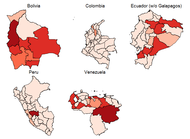
The Effects of Trade, Aid and Investment on China's Image in Latin America
Vera Z. Eichenauer, Andreas Fuchs and Lutz Brückner
Published in: Journal of Comparative Economics 49(2): 483-498, June 2021.
Abstract
Using repeated cross-sectional survey data, we analyze whether China’s growing economic engagement in Latin America has an effect on citizens’ perceptions of China within 18 Latin American countries over the 2002–2013 period. Our instrumental-variables regressions exploit exogenous variation in the supply of Chinese exports, aid, and investment. Specifically, we use China’s market penetration of developing countries outside of Latin America as the instrumental variable. In contrast to the widespread criticism, we do not find evidence that China’s growing economic activities in the respective countries diminish average attitudes towards China—neither at the national nor at the provincial level. However, China’s economic engagement appears to contribute to more polarized opinions on China: more individuals develop either very positive or very negative opinions on China. We interpret this as suggestive evidence that China’s economic engagement creates winners and losers.
Published paper
Supplementary information
Working paper (June 2018)
Working paper (March 2018)
Presentations at conferences and workshops
See also
Vera Z. Eichenauer, Andreas Fuchs and Lutz Brückner
Published in: Journal of Comparative Economics 49(2): 483-498, June 2021.
Abstract
Using repeated cross-sectional survey data, we analyze whether China’s growing economic engagement in Latin America has an effect on citizens’ perceptions of China within 18 Latin American countries over the 2002–2013 period. Our instrumental-variables regressions exploit exogenous variation in the supply of Chinese exports, aid, and investment. Specifically, we use China’s market penetration of developing countries outside of Latin America as the instrumental variable. In contrast to the widespread criticism, we do not find evidence that China’s growing economic activities in the respective countries diminish average attitudes towards China—neither at the national nor at the provincial level. However, China’s economic engagement appears to contribute to more polarized opinions on China: more individuals develop either very positive or very negative opinions on China. We interpret this as suggestive evidence that China’s economic engagement creates winners and losers.
Published paper
Supplementary information
- Online Appendix
- Replication dataset (request by email)
Working paper (June 2018)
Working paper (March 2018)
Presentations at conferences and workshops
- GEM Seminar, University of Groningen, Netherlands (02/2019)
- SITE Lunch Seminar, Stockholm School of Economics, Stockholm, Sweden (05/2018)
- Annual Conference of the Verein für Socialpolitik Research Committee Development Economics, University of Goettingen, Germany (06/2017)
- Workshop on Experiments in Foreign Aid Research: Views from Donor and Recipient Publics, University of California Washington Center, Washington, DC, USA (04/2017)
- Annual Conference of the International Political Economy Society, Durham, NC, USA (11/2016)
- Colloquium of the Center for Comparative & International Studies, ETH Zurich and University of Zurich, Switzerland (09/2016)
- Beyond Basic Questions Workshop, University of Salzburg, Austria (07/2016)
- Development Economics Conference "Goettinger Schule", University of Goettingen, Germany (06/2016)
- Annual Conference of the Verein für Socialpolitik Research Committee Development Economics, Heidelberg University, Germany (06/2016)
- Annual Meeting of the European Public Choice Society (EPCS), University of Freiburg, Germany (04/2016)
- Spring Meeting of Young Economists, ISCTE-IUL Lisbon, Portugal (03/2016)
- Seminar of the Department of Political Science, National University of Singapore (03/2016)
- Workshop on Foreign Direct Investment and Multinational Corporations, University of Mainz, Germany (11/2015)
See also
